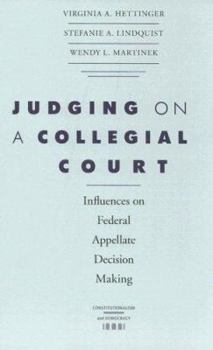Judging on a Collegial Court: Influences on Federal Appellate Decision Making
(Part of the Constitutionalism and Democracy Series)
Select Format
Select Condition 
Book Overview
in the professional world as a starting point for collaboration; rather than leaving decisions to just one person, dissent offers the opportunity to rethink or reinvent an idea, leading, one hopes, to a better result. When dissensus occurs in a federal court, however, it raises the question of whether this difference of opinion maintains the integrity of the judiciary or undermines its legitimacy. In Judging on a Collegial Court: Influences on Federal Appellate Decision Making, Virginia Hettinger, Stefanie Lindquist, and Wendy Martinek examine the dynamic that gives rise to such dissensus in federal appeals courts, revealing how the appellate process shapes the content and the consistency of the law. The authors examine horizontal dissensus in the minority of cases in which there are dissenting or concurring--as opposed to unanimous--opinions. Primarily investigating why judges on the appeals courts agree or disagree with one another regarding the outcomes of the cases before them, the authors also examine vertical dissensus and ask why judges affirm or reverse lower court judges whose cases are decided on appeal. Focusing on the behavioral aspects of disagreement within a panel and between the levels of the federal judicial hierarchy, the authors reveal the impact of individual attitudes or preferences on judicial decision-making, and hence on political divisions in the broader society.
Format:Paperback
Language:English
ISBN:0813926971
ISBN13:9780813926971
Release Date:July 2007
Publisher:University of Virginia Press
Length:168 Pages
Weight:0.60 lbs.
Dimensions:0.5" x 5.9" x 8.5"
Grade Range:Postsecondary and higher
Customer Reviews
0 rating





